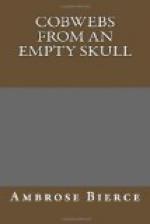A man crossing the great river of Egypt, heard a voice, which seemed to come from beneath his boat, requesting him to stop. Thinking it must proceed from some river-deity, he laid down his paddle and said:
“Whoever you are that ask me to stop, I beg you will let me go on. I have been asked by a friend to dine with him, and I am late.”
“Should your friend pass this way,” said the voice, “I will show him the cause of your detention. Meantime you must come to dinner with me.”
“Willingly,” replied the man, devoutly, very well pleased with so extraordinary an honour; “pray show me the way.”
“In here,” said the crocodile, elevating his distending jaws above the water and beckoning with his tongue—“this way, please.”
This fable shows that being asked to dinner is not always the same thing as being asked to dine.
XXXIII.
An old monkey, designing to teach his sons the advantage of unity, brought them a number of sticks, and desired them to see how easily they might be broken, one at a time. So each young monkey took a stick and broke it.
“Now,” said the father, “I will teach you a lesson.”
And he began to gather the sticks into a bundle. But the young monkeys, thinking he was about to beat them, set upon him, all together, and disabled him.
“There!” said the aged sufferer, “behold the advantage of unity! If you had assailed me one at a time, I would have killed every mother’s son of you!”
Moral lessons are like the merchant’s goods: they are conveyed in various ways.
XXXIV.
A wild horse meeting a domestic one, taunted him with his condition of servitude. The tamed animal claimed that he was as free as the wind.
“If that is so,” said the other, “pray tell me the office of that bit in your mouth.”
“That,” was the answer, “is iron, one of the best tonics in the materia medica.”
“But what,” said the other, “is the meaning of the rein attached to it?”
“Keeps it from falling out of my mouth when I am too indolent to hold it,” was the reply.
“How about the saddle?”
“Fool!” was the angry retort; “its purpose is to spare me fatigue: when I am tired, I get on and ride.”
XXXV.
Some doves went to a hawk, and asked him to protect them from a kite.
“That I will,” was the cheerful reply; “and when I am admitted into the dovecote, I shall kill more of you in a day than the kite did in a century. But of course you know this; you expect to be treated in the regular way.”
So he entered the dovecote, and began preparations for a general slaughter. But the doves all set upon him and made exceedingly short work of him. With his last breath he asked them why, being so formidable, they had not killed the kite. They replied that they had never seen any kite.




